
Does an Electric Water Heater Have a Pilot Light?
As a homeowner, I was curious about the inner workings of my appliances. One question that puzzled me was whether electric water heaters possess pilot lights. I delved into research to uncover the answer, and I’m eager to share my findings with you.
Contrary to gas water heaters, electric water heaters do not require a pilot light for operation. Instead, they utilize electric heating elements to warm the water. These elements are activated when the thermostat detects that the water temperature has dropped below the desired level. The absence of a pilot light eliminates the need for ignition and reduces the risk of gas leaks and potential hazards.
Advantages of Electric Water Heaters Without a Pilot Light:
The absence of a pilot light in electric water heaters offers several advantages:
- Energy Efficiency: Pilot lights continuously burn gas, consuming energy even when the water heater is not in use. Electric water heaters, on the other hand, only consume energy when heating water, leading to reduced energy consumption.
- Safety: Pilot lights utilize open flames, posing a potential fire hazard. Electric water heaters eliminate this risk, ensuring a safer environment in your home.
- Reliability: Pilot lights can occasionally malfunction, requiring repairs or replacement. Electric water heaters are generally more reliable, with fewer maintenance concerns.
How Electric Water Heaters Work:
Electric water heaters operate on the principle of resistive heating. A heating element, typically made of metal, is submerged in the water tank. When an electric current passes through the element, it encounters resistance, causing the element to heat up. This heat is then transferred to the surrounding water, raising its temperature.
Latest Trends and Developments:
The electric water heater industry is constantly evolving. Recent advancements include:
- Tankless Water Heaters: These innovative water heaters provide hot water on demand, eliminating the need for a storage tank. While they offer energy efficiency, they have higher upfront costs.
- Hybrid Water Heaters: Hybrid water heaters combine an electric heat pump with a traditional electric heating element. They utilize renewable energy sources, such as ambient air, to reduce operating costs.
- Smart Water Heaters: Smart water heaters connect to Wi-Fi, allowing remote monitoring and control. They can adjust water temperature based on usage patterns, optimizing energy consumption.
Tips and Expert Advice:
Based on my experience as a blogger, here are some tips and expert advice for electric water heater maintenance:
- Regular Maintenance: Schedule periodic inspections to check for leaks, sediment buildup, and other potential issues.
- Draining and Flushing: Drain and flush the water heater every 6-12 months to remove sediment and improve efficiency.
- Thermostat Adjustment: Adjust the thermostat to an optimal temperature between 120-140 degrees Fahrenheit to balance energy consumption and comfort.
General FAQ:
- Q: Why do electric water heaters not have a pilot light?
A: Electric water heaters utilize electric heating elements, eliminating the need for a gas flame and pilot light. - Q: Are electric water heaters more energy-efficient than gas water heaters?
A: Yes, electric water heaters generally consume less energy compared to gas water heaters, especially if they are well-insulated. - Q: How often should I service my electric water heater?
A: Experts recommend scheduling an annual inspection and service to ensure optimal performance and longevity.
Conclusion:
Electric water heaters stand out as a safe, energy-efficient, and reliable option for heating water in your home. They eliminate the need for a pilot light, reducing potential hazards and energy waste. As technology advances, electric water heaters continue to evolve, offering innovative features and enhanced performance. By following proper maintenance and care tips, you can ensure that your electric water heater provides years of efficient and trouble-free operation.
We encourage you to share your thoughts and experiences with electric water heaters in the comments section below. Are you interested in learning more about the latest advancements in water heating technology?